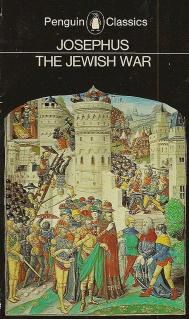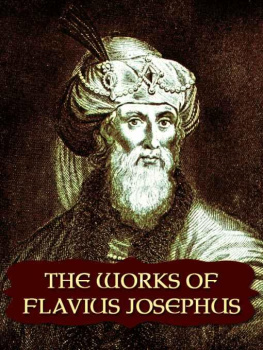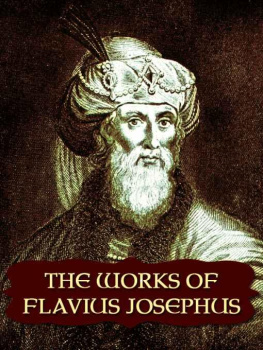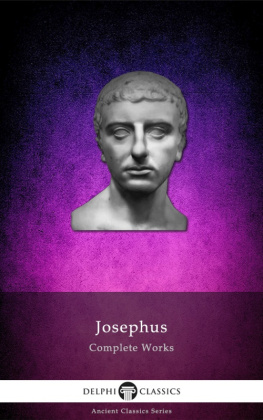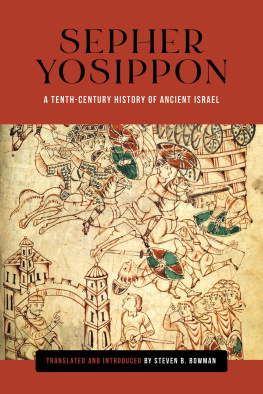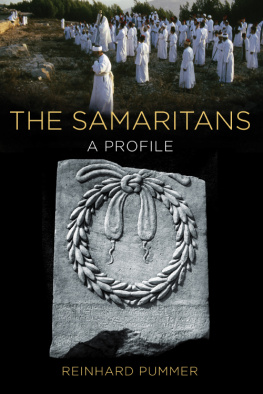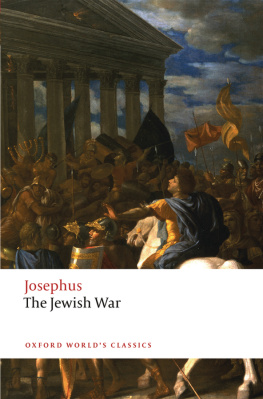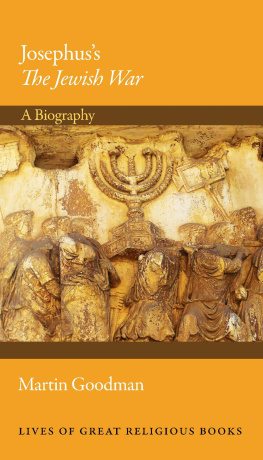Flavius Josephus - The Jewish War
Here you can read online Flavius Josephus - The Jewish War full text of the book (entire story) in english for free. Download pdf and epub, get meaning, cover and reviews about this ebook. year: 2014, publisher: Penguin Books Ltd, genre: Detective and thriller. Description of the work, (preface) as well as reviews are available. Best literature library LitArk.com created for fans of good reading and offers a wide selection of genres:
Romance novel
Science fiction
Adventure
Detective
Science
History
Home and family
Prose
Art
Politics
Computer
Non-fiction
Religion
Business
Children
Humor
Choose a favorite category and find really read worthwhile books. Enjoy immersion in the world of imagination, feel the emotions of the characters or learn something new for yourself, make an fascinating discovery.
- Book:The Jewish War
- Author:
- Publisher:Penguin Books Ltd
- Genre:
- Year:2014
- Rating:4 / 5
- Favourites:Add to favourites
- Your mark:
- 80
- 1
- 2
- 3
- 4
- 5
The Jewish War: summary, description and annotation
We offer to read an annotation, description, summary or preface (depends on what the author of the book "The Jewish War" wrote himself). If you haven't found the necessary information about the book — write in the comments, we will try to find it.
The Jewish War — read online for free the complete book (whole text) full work
Below is the text of the book, divided by pages. System saving the place of the last page read, allows you to conveniently read the book "The Jewish War" online for free, without having to search again every time where you left off. Put a bookmark, and you can go to the page where you finished reading at any time.
Font size:
Interval:
Bookmark:

JOSEPHUS
The Jewish War

TRANSLATED BY
G. A. WILLIAMSON
REVISED
WITH A NEW INTRODUCTION ,
NOTES AND APPENDIXES ,
BY E. MARY SMALLWOOD

Contents
Herods Predecessors |
Herods Rise to Power |
Herod Master of Palestine |
Herods Murder of Mariamme and her Children |
Herods Murder of his Heir, and Death |
The Rise and Fall of Archelaus |
Judaea under Roman Rule |
War Clouds |
The Outbreak of War |
Josephus Governor of Galilee |
The Coming of Vespasian and Titus |
Josephus the Prisoner of Vespasian |
Vespasians Conquering Advance |
Factions in Jerusalem |
Atrocities in the City. Vespasians Intervention |
Vespasian Emperor |
The Siege of Jerusalem First Stages |
| Two Walls Captured |
The Horrors of the Siege |
Antonia Captured and Destroyed |
The Temple Burnt and the City Taken |
Jerusalem Destroyed: Roman Celebrations |
Cleaning-up Operations |

THE JEWISH WAR
ADVISORY EDITOR: BETTY RADICE
J OSEPHUS was born in about 37 A.D . He was one of the Jewish leaders at the time of the revolt of the Jews in the reign of Nero. He commanded in Galilee and was captured by the Romans, but his life was spared. Spending the rest of his life in Rome, he was given Roman citizenship and became a friend of Titus and Vespasian. His two most important works are The Jewish War and The Jewish Antiquities
G. A. W ILLIAMSON was born in 1895 and was a Classical Exhibitioner at Worcester College, Oxford, graduating with a First Class Honours degree. He was Senior Classics Master at Norwich School from 1922 to 1960. He also translated Eusebius: The History of the Church (1965) and Procopius: The Secret History (1966) for the Penguin Classics. He died in 1982.
E. M ARY S MALLWOOD was born in 1919 and was a Classical Scholar at Girton College, Cambridge, graduating with a First Class Honours degree in 1942. She was later a Research Fellow at Girton College, where she obtained her Ph.D in 1951. Since then she was on the staff of the Queens University of Belfast, where she held a Personal Chair as Professor of Romano-Jewish history from 1978 until her retirement in 1983. Two of her other books are listed in the bibliography.
Foreword to this Edition
T HE translation here given is that of the first edition, Mr Williamsons eminently lucid and readable rendering, unaltered except for minor amendments, mostly merely editorial. His division of the work into twenty-three chapters, unrelated to the seven books of the original, presents it in much more easily digestible chunks than Josephus does.
The familiar Hebrew forms of Old Testament names such as Elijah are substituted for Josephus Grecized forms, and the name Jesus, common in his period, is given its Hebrew form Jeshua. The historian, however, is referred to by the Greek/Latin form of his name, Josephus, to distinguish him from other men with the same name, who appear as Joseph. I have taken the liberty of correcting Josephus mis-spelling of Sosius and Cerealis throughout.In the notes (pp. ) I have attempted to explain historical and other allusions which are likely to puzzle the non-specialist and make it difficult for him to follow the story. In the interests of brevity I have frequently made categorical statements unsubstantiated by evidence; full argument or documentation seems inappropriate here. It would have been easy and tempting to produce copious notes to pp. 27149, where the Antiquitates Judaicae (AJ) overlaps the Bellum Judaicum (BJ) , giving the parallel references in the AJ and the differences between the two accounts. But I have tried to resist that temptation, and to confine such references to essential or highly significant additions or variations in the AJ . The Loeb edition of AJ xiixx, has full and valuable notes. My notes also include many cross-references within the BJ , in the hope of saving time and reducing the frustration of search for the reader.To avoid repeated explanations or back-references to earlier notes, a few frequently used technical terms are explained in a glossary. Questions which would have produced cumbersome notes, points which are interdependent, explanations of recurrent details, and some peripheral matters are relegated to appendixes.As regards the introduction, the student seeking enlightenment on the finer points or deeper questions of Josephan scholarship will look in vain for it there. The introduction is designed, like the notes and other aids, for the general reader to whom Josephus is as yet a closed book and the ancient world as a whole is largely unfamiliar territory. It is no more than an attempt to set the writer and his works in their context, to explain some facets of ancient historiography which the newcomer may find strange, and to guide the reader towards some assessment of Josephus as a historian. After that the reader is left to encounter the BJ for himself and to form his own judgement on it.Belfast E. MARY SMALLWOOD
September, 1979
Introduction
JOSEPHUS LIFE
THE Bellum Judaicum , The Jewish War, was the first written of the four works of Josephus which have come down to us. In the course of it he describes, at disproportionate length, his own by no means wholly creditable exploits as commander in Galilee in A.D. 667. In that account he says not a word about his personal enemy, Justus, son of Pistus, from Tiberias, and their differing attitudes and policies. But some twenty years after the publication of the BJ Justus also produced a history of the war (not extant) which contained what Josephus regarded as such a distorted picture of his command that he felt impelled to produce the short work misleadingly called the Vita , his life, to clear his name. This composition is no full and balanced autobiography but is little more than a detailed account of his command, written with the avowedly apologetic purpose of defending himself against what he saw as slanders by Justus, very much longer even than the account in the BJ (though the siege of Jotapata, which provides one of the most extensive purple passages in the earlier work, gets only a few passing references). It is prefaced by a brief survey of his earlier life (five pages out of a total of eighty in the Loeb edition) and rounded off with an even shorter sketch of his fortunes after 67. But thanks to the first and last few pages of this distinctly unsatisfactory work, we have more detailed, and (presumably) reliable, information about the personal life of this historian than we have about many other ancient writers.
Josephus, son of Matthias, was born in A.D. 37 to a priestly family which proudly traced its pedigree back to the early Hasmonaeans. The year was ill-omened for both Romans and Jews in seeing the accession of the emperor Gaius (as a toddler nicknamed Caligula, little boot, when he was brought up in a camp on the Rhine, where his father was commander, and dressed in a miniature soldiers uniform). He was already mentally unbalanced when he came to the throne, and he was probably, in our terminology, certifiable by the time he was assassinated, less than four years later, for behaviour intolerable to the Romans. One of the outrageous actions of the last year of his life was an attempt to desecrate the Jewish Temple (pp. 13941), which, if carried through, would undoubtedly have precipitated a full-scale revolt a generation earlier than the one of which Josephus writes.Destined by his birth for the priesthood, Josephus was educated in a rabbinic school in Jerusalem, where, he tells us, by the age of about fourteen he had become such an authority on the intricacies of the Jewish Law that even senior priests and laymen prominent in the administration of the city came to him for the elucidation of knotty points. At about sixteen he spent some months studying successively with the Pharisees, the Sadducees and the Essenes (the monastic sect described on pp. 1337) in the hope of deciding which sect to join. But he was unable to make up his mind, and so went to live with an ascetic hermit in the desert for three years meditation. He returned to Jerusalem at nineteen, a Pharisee.Of the next seven years, presumably spent uneventfully on priestly duties, Josephus says nothing, but at the age of twenty-six he began to see the world: he took upon himself (apparently; he does not say that he was chosen by higher authorities) the minor but delicate diplomatic mission of sailing to Rome in the hope of securing the release of some fellow priests who had been sent to Nero to answer a charge which Josephus does not specify but describes as trivial. After a shipwreck en route which nearly deprived us of the BJ , he succeeded in getting his friends acquitted through the good offices of Neros wife Poppaea, to whom he was introduced by a Jewish actor he had met on landing in Italy. (One would like to know more about Jews in the theatrical profession. This one surely was an apostate, and the fact that Nero and Poppaea were among his fans is not evidence, as has been argued, that Poppaea had an interest in Judaism.)Josephus must have stayed in Rome for a couple of years or done an unrecorded grand tour on the way home, for he did not return until , when the war clouds had already gathered and were about to break. He did his best to prevent the revolt, of which he was to be the historian, at the eleventh hour by arguing with the nationalist leaders and trying to make them see that the outcome of war with Rome would inevitably be disaster; but to no avail. On the contrary, he made himself so unpopular that he had to take refuge in the inner court of the Temple to avoid being arrested and executed on suspicion of collusion with the Romans, and only dared to re-emerge after the murder of one of the prominent extremists, Menahem (pp. 1667), in September brought Jerusalem back under the control of the moderate party, to which he belonged.But by this time the the was cast; the extreme nationalists had carried the day, the Jews were in revolt against what they, with some justification, regarded as Roman oppression, and the Roman military forces had been driven out of Jerusalem. In November a legion which came from Syria to attempt to re-establish control was heavily defeated, and this irrevocably committed the Jews to war. The moderates, the peace party, now had no choice but to accept as inevitable the conflict which they had failed to prevent; but they tried to keep the direction of it out of the hands of the extremists and in their own hands, in the vain hope that, by ostensibly supporting them in preparing for full-scale warfare, they might win their confidence and then be able to persuade them to abandon a struggle foredoomed to failure. An ex-high priest (not the sort of man whom one would regard as an obvious military leader) assumed supreme control of operations in Jerusalem, and the rest of the country was divided into six regional commands. Josephus, a priest and a scholar, was appointed commander of the most northerly of the regions, Galilee.Despite his unpromising background, Josephus turned out to be a man of considerable natural military ability, but he was in the uncomfortable position of being commissioned to prepare for a war of which he did not approve. For some time his policy was to carry out his mandate by fortifying a large number of towns and training an army but neither to give nor to respond, to any provocation to conflict. This of course did not please the extremist leaders in the area, Justus of Tiberias among them, who were thirsting for action, and their attempts first to murder him and then to get the Jerusalem authorities to deprive him of his command, albeit unsuccessful, made life very difficult for him. By the spring of 67, however, he could sit on the fence no longer: when a large Roman force invaded Galilee and his army ran away, he threw in his lot with the rebels and retreated into the town of Jotapata. The siege of that strongly fortified and fanatically defended fortress lasted for nearly two months and ended with the capture of Josephus by the Romans in circumstances which redounded little to his credit (p. ).As a valuable prisoner Josephus was to have been sent to Nero, but he hastily turned the situation to his own advantage by prophesying to Vespasian, the Roman commander, that he would soon become emperor. Information that other predictions by Josephus had come true impressed Vespasian sufficiently for him to keep the encouraging prophet in honourable custody at his headquarters for the next two years, until in July 69 (by which time Nero had been dethroned and his two short-lived successors had met equally inglorious ends) his troops took a hand in the current game of emperor-making and proclaimed their popular and able commander emperor as a more worthy candidate for the throne than the effete glutton then occupying it. Josephus foresight was thus vindicated and promptly rewarded with freedom. He was to spend the rest of the war with the Roman forces, the only saf place for a man treated with such favour by the enemy that he was inevitably an object of the gravest suspicion to his own people.In the autumn of 69 Josephus accompanied Vespasian as far as Alexandria on the first stage of his journey to Rome to claim the throne, returning from there with Vespasians son Titus, now commander-in-chief, for the campaign which was to culminate in the siege and sack of Jerusalem the following summer, and incidentally with a new wife (the wife whom Vespasian had been kind enough to provide for him during his two years as a prisoner, a captive Jewish girl from Caesarea, having abandoned him when he set out for Alexandria). During the siege he was used on several occasions as an intermediary to appeal to the Jews, by oratory addressed to the defenders on the walls, to give up their futile resistance and save their city by surrender. His words, far from having the desired effect, served only to infuriate the Jews, who regarded him, with good reason, as a traitor and answered him with missiles, one of which found its target, though not fatally.After the fall of the city Titus offered to reward Josephus for his services by inviting him to help himself to anything he liked from the wreckage. The scholar in him accepted some copies of the Scriptures from Titus own hand, but to his credit he took no loot, asking as his reward merely the release of his brother, fifty friends, and a number of women and children of his acquaintance whom he found among the many lined up in the Temple court for deportation and enslavement. Later he used his influence to get three friends whom he saw being crucified reprieved and taken down. But such minor services as these could not wipe out his years on the Roman side, and although Titus, who had promised that after the war he would restore the land of all Jews who had not joined the revolt, gave Josephus an estate outside Jerusalem in lieu of his former property in the city, which lay in the area now earmarked for the camp of the new legionary garrison (p. 374), Josephus thought it prudent to decamp for good to Rome. And it turned out to be also highly advantageous personally; for when he reached Rome with Titus (and with his wife, who unlike her predecessor did not refuse to accompany him away from home), he was given the house in which Vespasian had lived as a private citizen, a pension for life, and Roman citizenship. Following the normal practice of enfranchised provincials, he took the family name of the emperor to whom he owed the grant of citizenship, Flavius Vespasianus, and Joseph, son of Matthias, became Flavius Josephus.The rest of Josephus life is largely the story of his literary works, to which we must soon turn. He gives us only one domestic detail: in 73 or 74 he divorced his wife soon after the birth of their third and only surviving child because he was displeased with the way she behaved (a phrase on which he lets our imaginations loose) and married a Jewess from Crete, who quickly presented him with two more sons. He apparently never revisited his native land, though Vespasian later gave him a second estate in Judaea, a large one, and Domitian (emperor from 81 to 96) exempted his property from the land-tax payable by all provincials, a highly coveted honour. Besides suffering the mendacious attack made on him c . 72 by one of the Jewish extremists who had escaped to Cyrenaica to stir up trouble there (p. 408), he was subject up to the 80s to accusations from Jews jealous, he says, of his good fortune. No doubt they in. their devastated country were jealous. But the conduct which had resulted in that good fortune will surely have rankled still more deeply, and it was not safe to set foot again among people who could not let bygones be bygones.The date of Josephus death is not known. He finished the AJ towards the end of 93 and wrote both the Vita (V) and the In Apionem (Ap.) after that. It is clear from the way in which he speaks of king Agrippa II in V 35960 that he outlived him; but that is of little help, since the date of Agrippas death is uncertain.Next pageFont size:
Interval:
Bookmark:
Similar books «The Jewish War»
Look at similar books to The Jewish War. We have selected literature similar in name and meaning in the hope of providing readers with more options to find new, interesting, not yet read works.
Discussion, reviews of the book The Jewish War and just readers' own opinions. Leave your comments, write what you think about the work, its meaning or the main characters. Specify what exactly you liked and what you didn't like, and why you think so.

